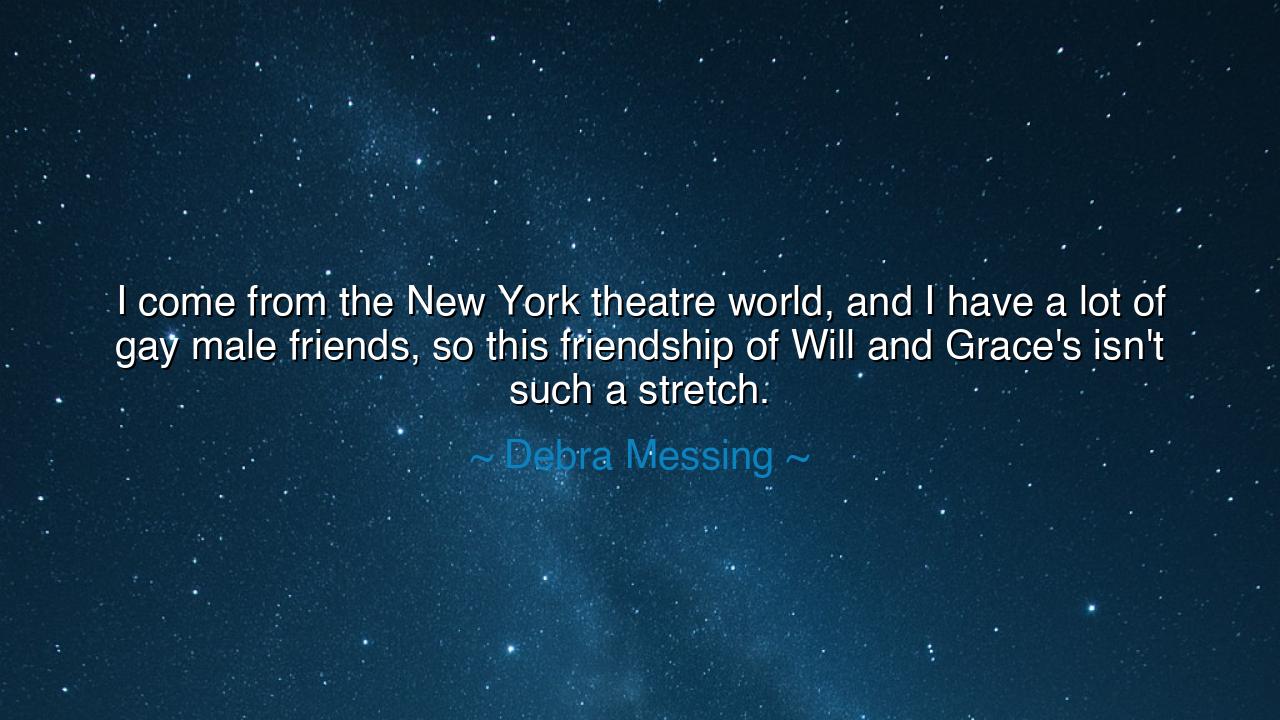
I come from the New York theatre world, and I have a lot of gay
I come from the New York theatre world, and I have a lot of gay male friends, so this friendship of Will and Grace's isn't such a stretch.






"I come from the New York theatre world, and I have a lot of gay male friends, so this friendship of Will and Grace's isn't such a stretch." — Debra Messing
In the boundless landscape of human connection, where bonds are formed across barriers of culture, background, and identity, there exists a type of friendship that transcends the conventional boundaries of what society deems possible or typical. Debra Messing, in her reflection on the iconic relationship between Will and Grace, speaks to a profound truth: that the essence of friendship—true and unshakable—has the power to break down the walls that divide us. Her words evoke the timeless lesson that friendship, particularly when it crosses boundaries of sexuality, gender, and societal expectation, is not merely an abstraction, but a living, breathing force that brings us closer together despite our differences.
Consider the ancient wisdom of the great philosophers, who spoke often of the unity of the human soul. Aristotle, in his writings on friendship, described it as a bond forged not in similarity alone, but in the shared recognition of the good within one another. Friendship, according to Aristotle, is not bound by identity or background, but by the virtue that one sees in another. The concept of mutual respect transcends the confines of gender or sexuality, and it is this deep respect that makes any true friendship possible. In the relationship between Will and Grace, we witness this principle in action: two souls who, despite being from different walks of life, find in each other something profound and beautiful that binds them together in friendship.
In the world of the New York theatre, where Debra Messing grew her roots, the diversity of human experiences and identities is both celebrated and embraced. The theatre, throughout history, has been a sanctuary for those who have been marginalized, a place where people of all sexual orientations, genders, and backgrounds can come together to explore the complexities of human connection. The theatre world, like Will and Grace, demonstrates that friendship is not constrained by the norms of society, but is a force that transcends those very norms, offering a sanctuary where all people, regardless of their identities, can find kinship and understanding.
Take, for example, the friendship between the great writers Virginia Woolf and Vita Sackville-West. Despite the complex nature of their relationship, which was layered with both romantic and platonic elements, their bond was one of profound respect and understanding. Woolf, often seen as the epitome of intellectual rigor, and Sackville-West, a poet and aristocrat, found in each other a connection that went beyond conventional ideas of love or companionship. Their friendship, complex and multi-faceted, mirrors the relationship between Will and Grace: an alliance that doesn’t fit into traditional molds but exists in a space where mutual understanding, support, and acceptance are paramount.
It is in this spirit of friendship, where differences are not just tolerated but celebrated, that the fictional bond between Will and Grace resonates with such authenticity. Messing’s personal experience, shaped by her own friendships with gay male friends, gives her the unique perspective that friendship is universal—not confined to any one group, but accessible to all who are open to sharing their hearts. The show’s portrayal of the friendship between Will, a gay man, and Grace, a heterosexual woman, shatters stereotypes and proves that true companionship is not bound by sexuality, gender, or even cultural background. It is born of shared joys, struggles, and the willingness to stand by one another through life’s trials.
The lesson we are to learn here is profound: friendship transcends boundaries that the world would place before us. Whether in the context of a television show, an ancient philosopher’s teachings, or the real lives of those around us, we must recognize that friendship is the force that unites us all. It is a bond built not upon the superficial differences of appearance or sexual orientation, but upon the mutual recognition of humanity—the shared journey we walk together as beings in this world. Debra Messing’s reflection on Will and Grace speaks to this deeper truth: that when we open our hearts to one another, when we allow respect and love to guide our connections, there is no barrier too great to overcome, no identity too different to form a lasting, meaningful bond.
So, let us follow the example set before us. Let us celebrate the friendships in our lives, especially those that may seem unlikely or unconventional. Let us listen to those who come from different walks of life, and let our hearts remain open to the transformative power of friendship that breaks down walls and builds bridges. Just as Will and Grace defied traditional expectations and found deep connection in their differences, so too can we find meaning and purpose in our relationships, transcending labels and embracing the shared humanity that unites us all. Let this be the legacy we leave: a world where friendship is not confined by the limits of society’s norms, but instead, flourishes in the freedom of mutual understanding, respect, and love.






AAdministratorAdministrator
Welcome, honored guests. Please leave a comment, we will respond soon